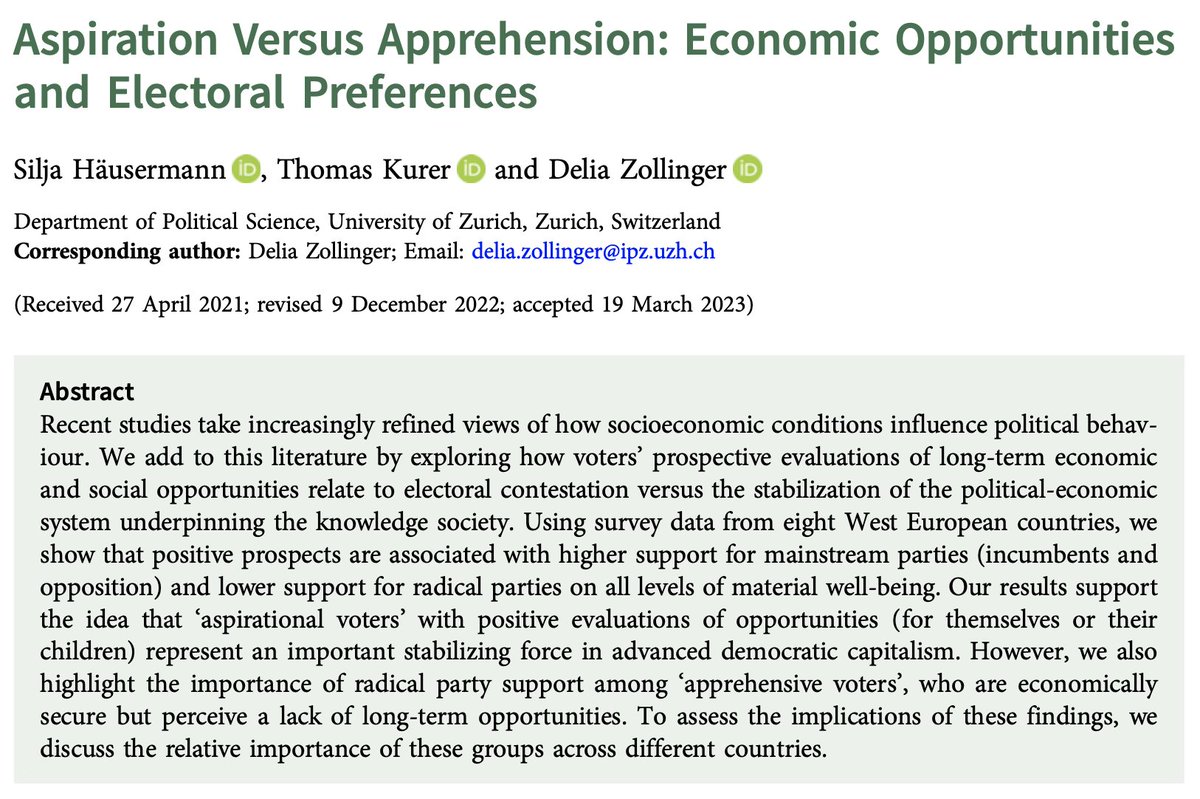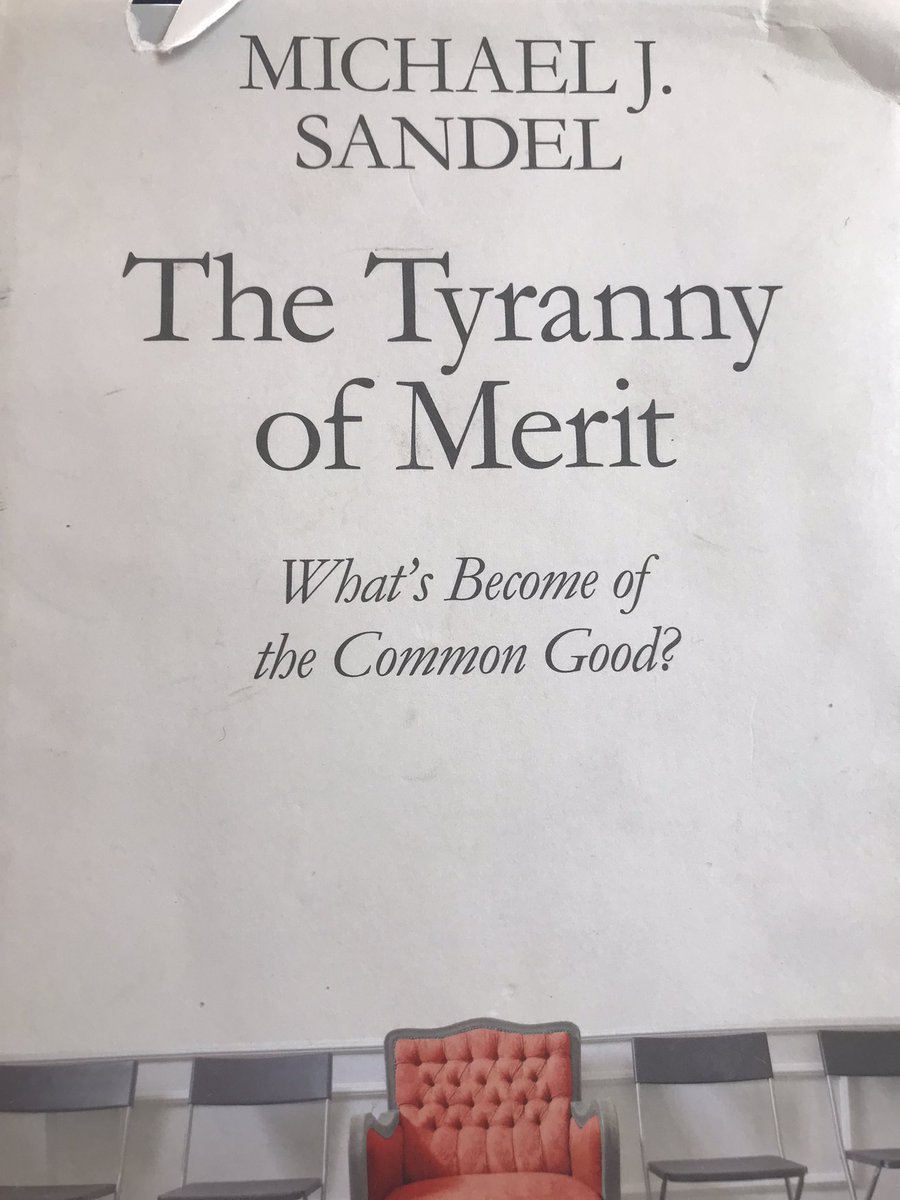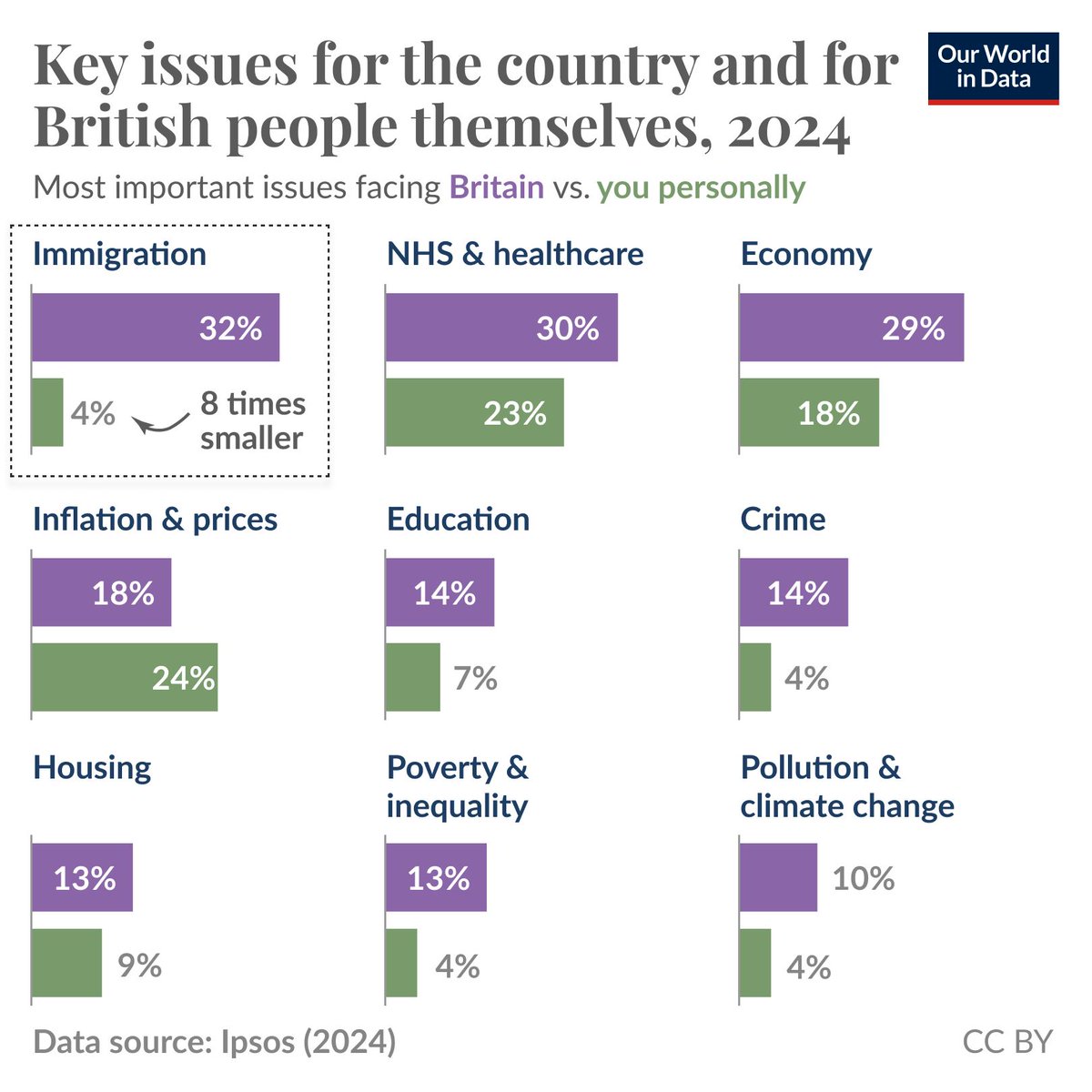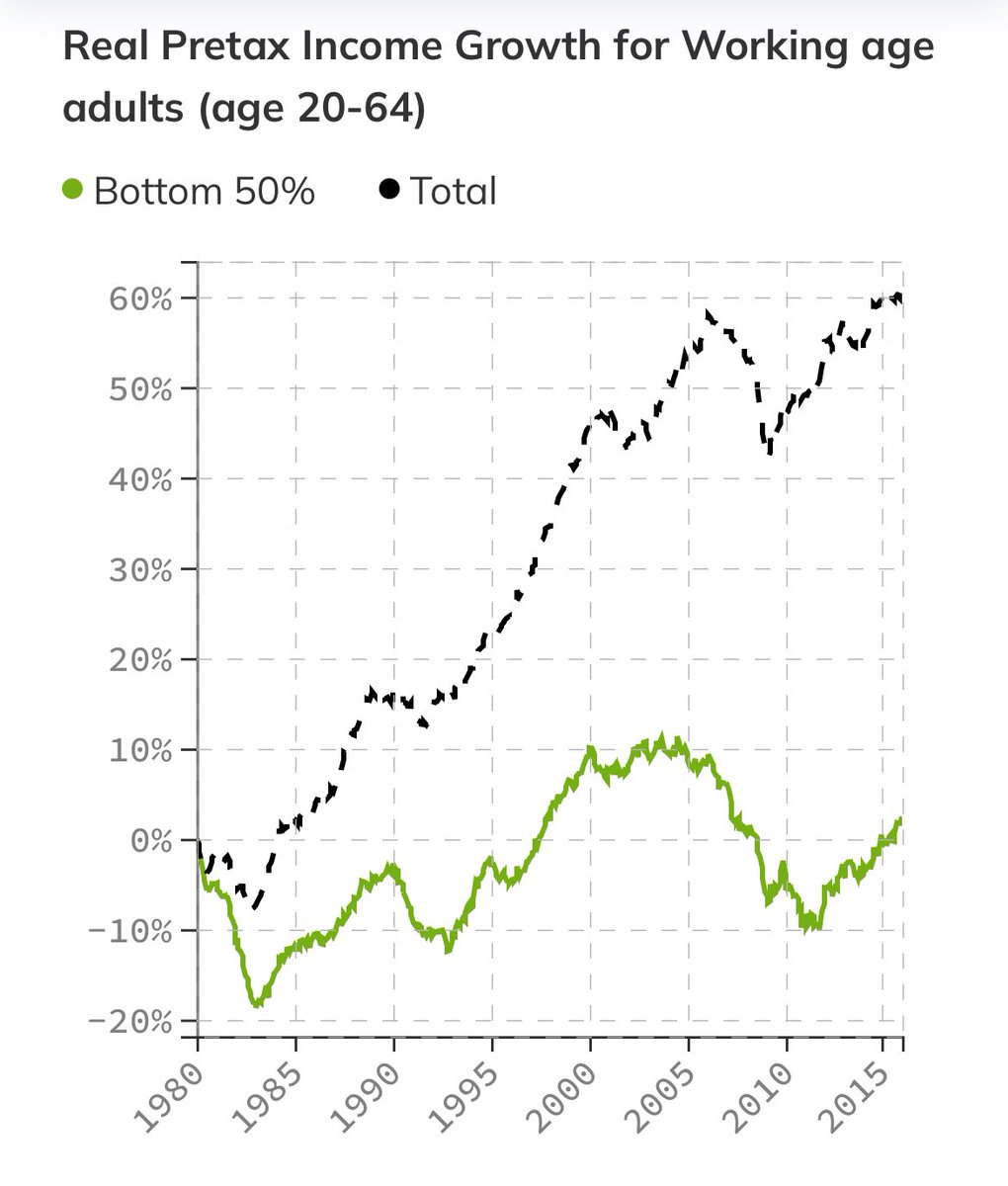
Ayşenur Değer
@deger_aysenurGrievance Politics, Populism, Inequality, Polarization, Persuasion. Political Science PhD Candidate @MaxwellSU | https://t.co/M9QaYl5ifH
Similar User

@alicectimken

@KyungwonSuh

@gizem_rkn

@uguraltundal

@CoriniumMuseum

@DidemSeyis

@XiaoxiaHuang219

@aykut_ozturk_

@NateCarrington

@SefaSecen3

@es_ekinci

@Matt_Cleary_SU

@aaron_lattanzi
In light of the ongoing discourse: A key lesson I picked up from a mentor in grad school: we don’t live in a mono-causal social or political world. Multiple mechanisms often explain outcomes. One might be more impt or compelling, but it’s rarely either/or—more often both/and.
🚨 Working paper alert 🚨 “The Limitations of Using Forced Choice in Electoral Conjoint Experiments” osf.io/qwjat Most conjoint experiments force participants to select between candidates, ignoring real-world choices like abstention or protest votes. 🧵 Quick thread

'The true class divide in British politics is not which party people choose, but whether they vote at all' A recent article by @olhe and me on the problem of growing working class abstention. Read here: theconversation.com/the-true-class…

We show that perceptions of future opportunities matter for radical (esp. right) party support at lower *and* high levels of economic well-being. A long-term structural perspective matters (beyond a short-term perspective on incumbency vs. opposition) 3/4


New article on voters’ perceptions of future economic opportunities and their electoral preferences with @thmskrr & @SiljaHausermann in @BJPolS! 1/4 doi.org/10.1017/S00071…

Important piece by @jonhenley in the Guardian on the housing crisis and far right support. Also discusses our study on increasing local rents and voting for the AfD. Plus some expert comment by my fabulous colleague @ValentimVicente theguardian.com/news/article/2…
Identity politics is bound up with the real material stuff of life—like whether Black people can have non-fatal encounters with the police, whether trans people can move safely in their neighborhoods, and whether women have access to reproductive health care.
I’m tired, but: Demonizing immigrants, using trans folks as political pawns, leaning into racist & sexist stereotypes to denigrate your political opponents, banning books that make white people feel bad, appealing to whiteness and masculinity—all of this is identity politics.
Loving “Class Attitudes in America” by @SpencerPiston sympathy for the poor & resentment of the rich are widespread & can be big advantages for Dems & liberal policy; invoked more often than broad views about inequality, redistribution, or egalitarianism amazon.com/Class-Attitude…
I think that Sandel's book "The tyranny of merit" is very informative on why the Democrats lost the election to Trump: the (political) promise that everyone gets what s/he deserves when working hard legitimises inequality, demoralizes the working-class and soul-destroys the rich.

Such an important graph to understand the politics of our time (it also hold in other countries). It shows how much concerns about immigration are driven by political and media narratives. The vicious cycle of accommodating the far right and making immigration a political issue.
British people see immigration as a major concern for the country, but not in their own lives— Ipsos surveyed British people about the most critical issues facing the country and the most important issues they face personally. The chart shows the answers across nine different…

The emphasis on the Latino and black shifts are important, but could mystify the diagnosis on why Trump won…
British people see immigration as a major concern for the country, but not in their own lives— Ipsos surveyed British people about the most critical issues facing the country and the most important issues they face personally. The chart shows the answers across nine different…

Across the board the conversations began with expressions of what I can only describe as deep disgust in politics. Severe distrust in politicians and the status quo. And this wasn’t about the specifics of the moment, but instead deep seated long-term dissatisfaction. 2/12
…the poorest half saw a solid increase in their incomes between 2016 and 2020, faster than that of average Americans. And then, over 2020-2023, real pretax income growth at the bottom was back to nearly zero, slightly below the sluggish average. Data: realtimeinequality.org


Between 1980 and 2016, real pretax income growth of the poorest half of the US working age population was nearly 0%, while the economy boomed. Yet we were surprised by Trump’s first election. Now, look at what happened over 2016-2020…

This is such an excellent article on economic inequality. Social media has focused our attention on conflict *between* generations (Millennials vs. Boomers), because that drives clicks. But the real source of economic inequality has always between *within* generations. And the…

Is it possible to separate the effects of economic shocks from cultural concerns in voting behavior? 🚨New paper at @cps_journal🚨Italo @PStanig & I address the methodological difficulties in making such distinctions and provides new evidence on the globalization backlash 1/5

Happy to share our new article on public support for authoritarian regimes, published at @cps_journal! Relying on the Turkish case, we develop a conceptual and theoretical framework that can travel to all authoritarian regimes. Here is why this is an important paper:

United States Trends
- 1. #UFC309 74 B posts
- 2. #MissUniverse 232 B posts
- 3. Beck 15,9 B posts
- 4. Dinamarca 15,1 B posts
- 5. Brian Kelly 9.918 posts
- 6. Oregon 26,6 B posts
- 7. Jim Miller 9.165 posts
- 8. Mac Miller N/A
- 9. #AEWCollision 13,4 B posts
- 10. Dalton Knecht 4.303 posts
- 11. Wisconsin 45,3 B posts
- 12. Inside the NBA 5.478 posts
- 13. Nigeria 225 B posts
- 14. Tennessee 41,6 B posts
- 15. Martinez 70,2 B posts
- 16. #DevilWearsHope 7.274 posts
- 17. Feds 37 B posts
- 18. Chile 185 B posts
- 19. Tailandia 8.241 posts
- 20. Nebraska 12,7 B posts
Who to follow
-
 alice cho timken
alice cho timken
@alicectimken -
 Kyungwon Suh
Kyungwon Suh
@KyungwonSuh -
 Gizem Arikan
Gizem Arikan
@gizem_rkn -
 Uğur Altundal
Uğur Altundal
@uguraltundal -
 Corinium Museum
Corinium Museum
@CoriniumMuseum -
 Didem Seyis
Didem Seyis
@DidemSeyis -
 Xiaoxia Huang
Xiaoxia Huang
@XiaoxiaHuang219 -
 Aykut Öztürk
Aykut Öztürk
@aykut_ozturk_ -
 Nathan Carrington
Nathan Carrington
@NateCarrington -
 Sefa Secen
Sefa Secen
@SefaSecen3 -
 Esra Ekinci
Esra Ekinci
@es_ekinci -
 Matt Cleary
Matt Cleary
@Matt_Cleary_SU -
 Aaron Lattanzi
Aaron Lattanzi
@aaron_lattanzi
Something went wrong.
Something went wrong.



























































































































